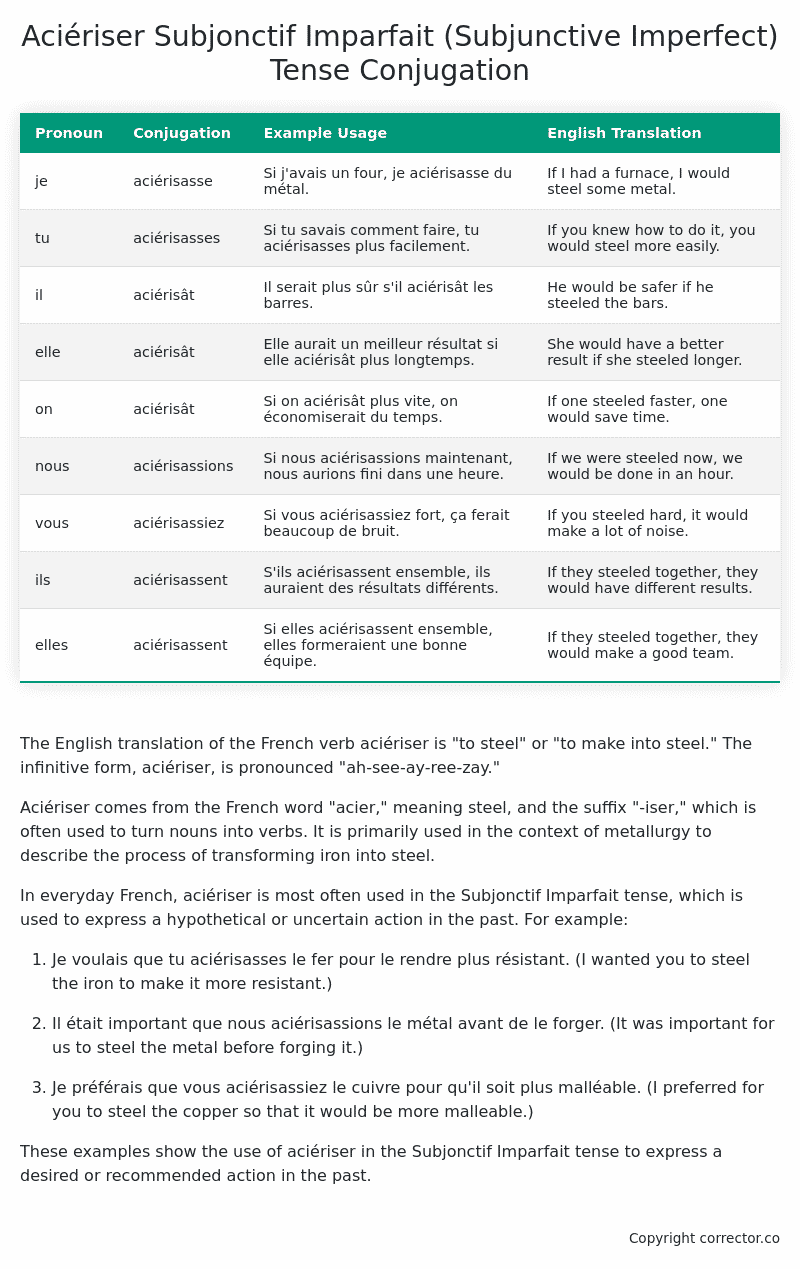Subjonctif Imparfait (Subjunctive Imperfect) Tense Conjugation of the French Verb aciériser
Introduction to the verb aciériser
The English translation of the French verb aciériser is “to steel” or “to make into steel.” The infinitive form, aciériser, is pronounced “ah-see-ay-ree-zay.”
Aciériser comes from the French word “acier,” meaning steel, and the suffix “-iser,” which is often used to turn nouns into verbs. It is primarily used in the context of metallurgy to describe the process of transforming iron into steel.
In everyday French, aciériser is most often used in the Subjonctif Imparfait tense, which is used to express a hypothetical or uncertain action in the past. For example:
-
Je voulais que tu aciérisasses le fer pour le rendre plus résistant. (I wanted you to steel the iron to make it more resistant.)
-
Il était important que nous aciérisassions le métal avant de le forger. (It was important for us to steel the metal before forging it.)
-
Je préférais que vous aciérisassiez le cuivre pour qu’il soit plus malléable. (I preferred for you to steel the copper so that it would be more malleable.)
These examples show the use of aciériser in the Subjonctif Imparfait tense to express a desired or recommended action in the past.
Table of the Subjonctif Imparfait (Subjunctive Imperfect) Tense Conjugation of aciériser
| Pronoun | Conjugation | Example Usage | English Translation |
|---|---|---|---|
| je | aciérisasse | Si j’avais un four, je aciérisasse du métal. | If I had a furnace, I would steel some metal. |
| tu | aciérisasses | Si tu savais comment faire, tu aciérisasses plus facilement. | If you knew how to do it, you would steel more easily. |
| il | aciérisât | Il serait plus sûr s’il aciérisât les barres. | He would be safer if he steeled the bars. |
| elle | aciérisât | Elle aurait un meilleur résultat si elle aciérisât plus longtemps. | She would have a better result if she steeled longer. |
| on | aciérisât | Si on aciérisât plus vite, on économiserait du temps. | If one steeled faster, one would save time. |
| nous | aciérisassions | Si nous aciérisassions maintenant, nous aurions fini dans une heure. | If we were steeled now, we would be done in an hour. |
| vous | aciérisassiez | Si vous aciérisassiez fort, ça ferait beaucoup de bruit. | If you steeled hard, it would make a lot of noise. |
| ils | aciérisassent | S’ils aciérisassent ensemble, ils auraient des résultats différents. | If they steeled together, they would have different results. |
| elles | aciérisassent | Si elles aciérisassent ensemble, elles formeraient une bonne équipe. | If they steeled together, they would make a good team. |
Other Conjugations for Aciériser.
Le Present (Present Tense) Conjugation of the French Verb aciériser
Imparfait (Imperfect) Tense Conjugation of the French Verb aciériser
Passé Simple (Simple Past) Tense Conjugation of the French Verb aciériser
Passé Composé (Present Perfect) Tense Conjugation of the French Verb aciériser
Futur Simple (Simple Future) Tense Conjugation of the French Verb aciériser
Futur Proche (Near Future) Tense Conjugation of the French Verb aciériser
Plus-que-parfait (Pluperfect) Tense Conjugation of the French Verb aciériser
Passé Antérieur (Past Anterior) Tense Conjugation of the French Verb aciériser
Futur Antérieur (Future Anterior) Tense Conjugation of the French Verb aciériser
Subjonctif Présent (Subjunctive Present) Tense Conjugation of the French Verb aciériser
Subjonctif Passé (Subjunctive Past) Tense Conjugation of the French Verb aciériser
Subjonctif Imparfait (Subjunctive Imperfect) Tense Conjugation of the French Verb aciériser (this article)
Subjonctif Plus-que-parfait (Subjunctive Pluperfect) Tense Conjugation of the French Verb aciériser
Conditionnel Présent (Conditional Present) Tense Conjugation of the French Verb aciériser
Conditionnel Passé (Conditional Past) Tense Conjugation of the French Verb aciériser
L’impératif Présent (Imperative Present) Tense Conjugation of the French Verb aciériser
L’infinitif Présent (Infinitive Present) Tense Conjugation of the French Verb aciériser
Struggling with French verbs or the language in general? Why not use our free French Grammar Checker – no registration required!
Get a FREE Download Study Sheet of this Conjugation 🔥
Simply right click the image below, click “save image” and get your free reference for the aciériser Subjonctif Imparfait tense conjugation!

Aciériser – About the French Subjonctif Imparfait (Subjunctive Imperfect) Tense
Formation
Common Everyday Usage Patterns
Interactions with Other Tenses
Subjonctif Présent
Indicatif Passé Composé
Conditional
Conditional Perfect
Summary
I hope you enjoyed this article on the verb aciériser. Still in a learning mood? Check out another TOTALLY random French verb conjugation!


